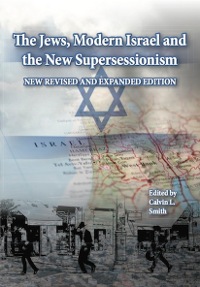The Jews, Modern Israel and the New Supersessionism, revised edition, edited by Calvin L. Smith.
A welcome resource with a little way to go
by Fran Waddams
 Having watched Calvin Smith debate so effectively on TV with fierce opponent of Christian Zionism, Stephen Sizer, a couple of years ago, I awaited this series of essays ‘The Jews, Modern Israel and the new Supercessionism’ with some impatience.
Having watched Calvin Smith debate so effectively on TV with fierce opponent of Christian Zionism, Stephen Sizer, a couple of years ago, I awaited this series of essays ‘The Jews, Modern Israel and the new Supercessionism’ with some impatience.
That the essays would be scholarly was beyond doubt. But Smith wants more than that. His aim is to give ‘everyday Christians’ a toolbox of ‘resources to draw upon’ as they debate issues around the topic of the relationship that Christians should have with the modern State of Israel. Smith is driven, he writes, by ‘an urgent desire to respond to growing anti-Israel sentiment and Christian anti-Zionism among some Evangelicals.’
With his choice of essayists Smith certainly succeeds in ‘challenging disingenuous efforts by … supercessionist commentators aimed at portraying all (Zionist) Christians …….. as a somehow narrow, peripheral and fanatical segment of the church.’ Written by such varied authors as Calvinist Stephen Vantassel and Charismatic Steve Malz, the range of Zionist Christians can scarcely be described as narrow.
There’s a useful arrangement of material too, as readers can see the roots of supersessionism in Plato and his Christian admirers through to New Testament writers and the Early Church rejection of its Jewish roots, culminating with the baleful effects of Supersessionism from 19th Century until today.
Any reader would find valuable information in these essays, depending on the questions they are asking or being required to answer. I found Jacob Prasch’s exposition of Jewish hermeneutics – which can broadly be defined as a ‘both and’ approach as opposed to the typical Western Christian ‘either / or’ approach – particularly enlightening. And who could fail to be horrified by the anti-semitism in the polemic of the so-called ‘Church Fathers’ chillingly described by Barry E Horner and their interpretations of New Testament literature as explained by Ronald Diprose.
I hadn’t reflected before on the effects that the new Supersessionism is having on Jewish (Messianic) disciples of Jesus. So Brian Brewer and Richard Gibson’s essays made for sobering reading, showing how the lives and witness of Messianic Jews are made that much harder as their identity is robbed of meaning by a view that Christians worship a God who is no longer ‘the God of Abraham, Isaac and Jacob’.
There was just one niggle at the back of my mind as I read these essays. As well as thoughtful engagement with the Scriptures and with history, I wanted some direct engagement with arguments presented in widely read Christian anti-Zionist authors – say, Steven Sizer or Colin Chapman or Naim Ateek, and I found not a lot. The sort of thing I mean is in Smith’s cracking example in his final essay Faith and Politics in Today’s Holy Land, as he challenges two prevalent myths – that of a monolithic hatred of Israel amongst Arab Christians, and Israel as a haven of peace and security for all followers of Christ. The essays would, I think, have been even more effective tools of debate had each author related the insights they gave to at least one point raised by Israel’s Christian opponents.
Nevertheless, this is a timely enterprise as Evangelicals watch with dismay, their fellow Churchmen turning their backs on what Scripture has to say about the Covenant-keeping God of Abraham, Isaac and Jacob in pursuit of a new doctrine of ‘human rights’. And this at the expense of people who have suffered horribly for centuries at the hands of a Church too often determined to exalt its own standing with God by demeaning the ancient olive branch from whom the Scriptures and the Messiah Himself have come and into which we, by God’s grace, have been grafted.